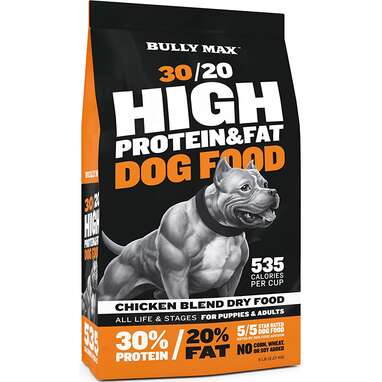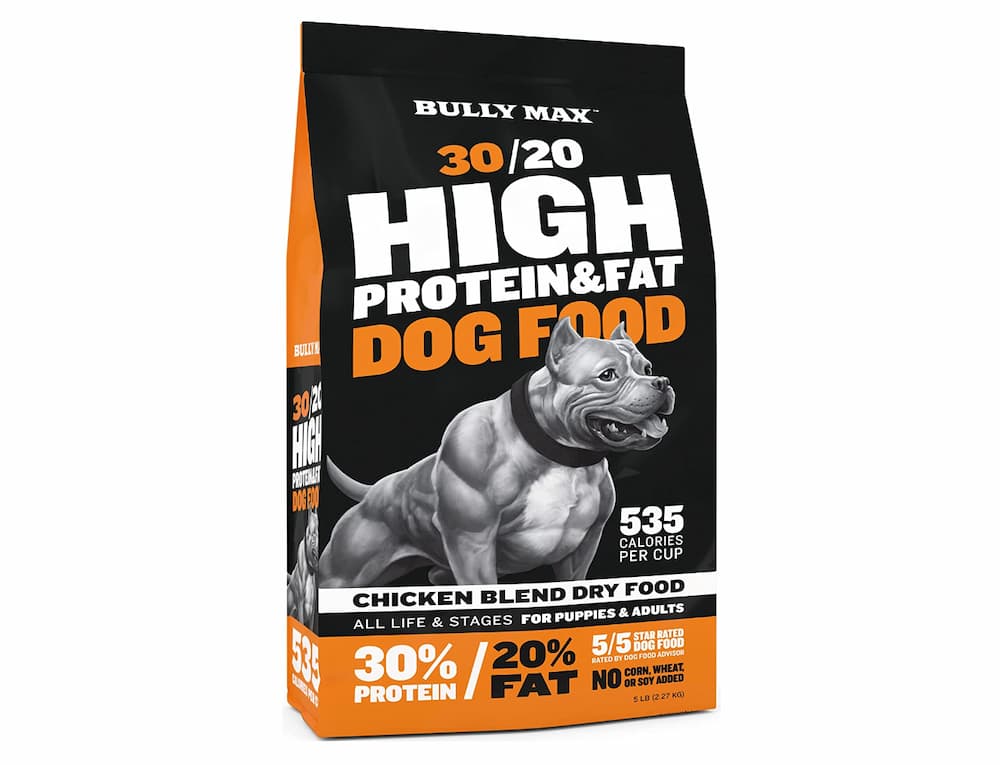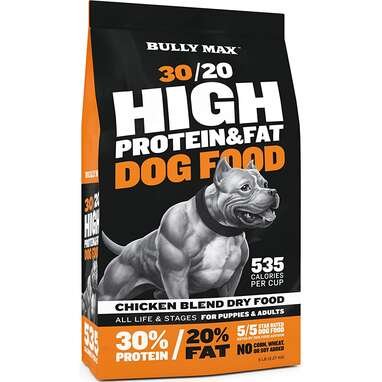Did you know that Pitbulls have unique nutritional needs that require a specific type of dog food?
Pitbulls were originally bred for fighting, which means they have a higher muscle mass and energy level than other dog breeds. This makes it important to feed them a protein-rich diet that supports their muscle development and overall health. A study conducted by the American Pit Bull Terrier Club found that a high-quality dog food with a protein content of at least 25% is crucial for Pitbulls to maintain their optimal body condition. Additionally, it is important to choose a dog food that is free from fillers, artificial additives, and common allergens to prevent any potential health issues. Meeting these nutrition requirements will help ensure that your Pitbull is healthy and thriving.

The Best Dog Food for a Pitbull: Ensuring Optimal Health and Nutrition
1. Understanding the Nutritional Needs of Pitbulls
Pitbulls are a strong and muscular breed of dog that requires a well-balanced and nutrient-dense diet to maintain their optimal health. Being an active and energetic breed, pitbulls have specific nutritional needs that must be met to ensure their overall well-being. The best dog food for a pitbull should contain high-quality protein sources, healthy fats, essential vitamins and minerals, and limited fillers or artificial additives. These elements help support their energy levels, muscle development, immune system, and overall vitality.
When looking for the best dog food for your pitbull, it’s important to consider their age and activity level. Puppies, adult dogs, and senior pitbulls have slightly different nutritional requirements. Additionally, if your pitbull engages in activities such as agility competitions or intense exercise, their dietary needs may vary compared to a less active dog. Therefore, choosing a dog food that is specifically formulated for pitbulls and their life stage is essential.
2. Finding High-Quality Protein Sources
Protein is a crucial component of any dog’s diet, especially for pitbulls who have a higher lean muscle mass. When selecting the best dog food for a pitbull, prioritize options that include high-quality animal proteins as the main ingredient. Look for real meat sources such as chicken, beef, turkey, or fish, as these provide essential amino acids that support muscle development and repair. Avoid dog foods that list generic terms like “meat meal” or “by-products” as these may contain lower quality protein sources and fillers.
It’s also beneficial to choose a dog food that includes a variety of animal proteins. This helps ensure that your pitbull receives a wide range of essential nutrients. Rotating between protein sources can also help prevent the development of food allergies or sensitivities. Always check the guaranteed analysis on the dog food label to verify that it contains an adequate percentage of protein for your pitbull’s needs.
3. The Role of Healthy Fats in Pitbull Nutrition
Fat is an important component of a pitbull’s diet as it provides concentrated energy and aids in the absorption of fat-soluble vitamins. When selecting the best dog food for your pitbull, look for options that include high-quality fats from sources such as chicken fat, fish oil, or flaxseed oil. These fats provide essential omega-3 and omega-6 fatty acids, which promote healthy skin and coat, aid in joint health, and support brain development.
Avoid dog foods that contain excessive amounts of unhealthy fats, such as artificial trans fats or excessive saturated fats. These can lead to weight gain and other health issues in your pitbull. As with any nutritional component, it’s important to ensure a balanced approach and consult with your veterinarian to determine the appropriate amount of fat for your pitbull’s specific needs.
4. Additional Considerations: Natural Ingredients, Digestibility, and Allergies
In addition to meeting the basic nutritional needs of your pitbull, it’s important to pay attention to the quality and digestibility of the ingredients. Look for dog foods that use natural, whole food ingredients rather than artificial additives or preservatives. High-quality dog foods often contain fruits, vegetables, and whole grains that provide additional vitamins, minerals, and fiber.
Digestibility is another critical factor to consider when choosing the best dog food for your pitbull. Highly digestible dog foods ensure that your pitbull can absorb and utilize the nutrients effectively, reducing the risk of digestive issues. If your pitbull has known food allergies or sensitivities, opt for dog foods that are specifically formulated to address these concerns, such as those free from common allergens like wheat, corn, or soy.
Investing in a high-quality dog food for your pitbull is a wise decision as it sets the foundation for their long-term health and well-being. Pairing a nutritious diet with regular exercise and routine veterinary check-ups will help ensure that your pitbull thrives and lives a happy and healthy life.
Additional Considerations for Feeding a Pitbull
1. Meal Frequency and Portion Control
Understanding the dietary needs of your pitbull and feeding them the right amount is crucial for their overall health. Pitbulls generally require two meals per day, evenly spaced to maintain a consistent energy level. Puppies, on the other hand, may require smaller, more frequent meals to support their growth and development. It’s important to consult with your veterinarian to determine the appropriate portion size for your pitbull based on their age, weight, and activity level. Overfeeding can lead to obesity, while underfeeding can result in nutrient deficiencies and growth issues.
2. Hydration is Key
Providing your pitbull with access to clean and fresh water at all times is essential for their hydration. Particularly during hot weather or after intense physical activity, pitbulls may require more water to stay properly hydrated. Ensure that your pitbull’s water bowl is always filled, and regularly clean it to prevent bacterial growth. If you notice signs of dehydration, such as lethargy, dry gums, or excessive panting, consult with your veterinarian immediately.
3. Treats and Snacks
While it’s important to prioritize a high-quality dog food for your pitbull, occasional treats and snacks can be a part of their diet. However, it’s crucial to choose treats that are nutritious and specially formulated for dogs. Avoid giving your pitbull table scraps or human food, as certain ingredients can be harmful to their health. As with any addition to their diet, it’s important to consider the overall calorie intake to prevent weight gain and health issues.
The Pitbull Diet: A Recipe for Health
1. Ensuring a Balanced Diet
One key aspect of providing the best dog food for a pitbull is ensuring a balanced diet. This means incorporating the right amounts of protein, carbohydrates, fats, and fiber into their meals. Protein should make up a significant portion of their diet, aim for around 25-30% protein content. Carbohydrates can come from whole grains, fruits, and vegetables, providing essential vitamins and fiber. Healthy fats, such as fish oil or flaxseed oil, should be included in moderation. Consult with your veterinarian to create a balanced meal plan that meets the specific needs of your pitbull.
2. Introducing Homemade Diets
While many high-quality commercial dog foods are available on the market, some owners prefer to prepare homemade meals for their pitbulls. If you choose to go this route, it’s crucial to work with a veterinary nutritionist to ensure that your homemade dog food meets all the nutritional requirements. Homemade diets may require additional supplementation to ensure your pitbull receives all the essential vitamins and minerals they need. A veterinary professional can guide you in creating a well-rounded and nutritious homemade meal plan for your pitbull.
3. Transitioning to a New Dog Food
If you decide to switch your pitbull’s dog food, it’s important to do so gradually to prevent digestive upset. Start by mixing a small portion of the new food with their current food, gradually increasing the ratio of new food to old food over the course of one to two weeks. Monitor your pitbull closely during this transition period and consult with your veterinarian if any issues arise. Remember, every dog is unique, and what works for one pitbull may not work for another, so it’s important to be attentive to their individual needs.
In conclusion, choosing the best dog food for your pitbull plays a significant role in their overall health and well-being. Prioritize high-quality protein sources, healthy fats, and natural ingredients to ensure they receive optimal nutrition. Consider factors like their age, activity level, and any specific dietary needs they may have. Regularly consult with your veterinarian to ensure you are meeting your pitbull’s nutritional requirements. With the right diet and proper care, your pitbull will enjoy a happy, healthy, and vibrant life by your side.
Key Takeaways: What is the Best Dog Food for a Pitbull?
- 1. Look for high-quality protein sources like chicken or beef as the first ingredient in the dog food.
- 2. Avoid dog food with fillers and artificial additives, as they may not provide the necessary nutrition for your pitbull.
- 3. Consider dog food formulated specifically for large dog breeds or active dogs, as pitbulls have higher energy needs.
- 4. Consult with your veterinarian to determine any specific dietary requirements or health conditions that may affect your pitbull’s food choices.
- 5. Gradually introduce new dog foods to your pitbull’s diet to avoid digestive upset and monitor their reaction to different brands or formulas.
Frequently Asked Questions
Welcome to our FAQ section on finding the best dog food for a pitbull! If you have questions about what food is most suitable for your pitbull, you’re in the right place. We’ve compiled some commonly asked questions to help guide you.
Q: How can I determine the best dog food for my pitbull?
A: Determining the best dog food for your pitbull involves considering their age, size, health needs, and personal preferences. It’s essential to choose a high-quality dog food brand that meets the nutritional requirements for pitbulls. Look for a formula that contains a sufficient amount of protein, with real meat listed as the first ingredient. Avoid fillers like corn, soy, and artificial additives, as these can negatively impact your pitbull’s digestion. Consulting with your veterinarian can also provide valuable insight into finding the right food for your pitbull’s specific needs.
In conclusion, finding the best dog food for your pitbull requires considering their individual needs, a high-quality ingredient list, and avoiding any potential allergens or fillers that may be harmful to their health.
Q: Can I feed my pitbull a raw diet?
A: While some pet owners choose to feed their pitbulls a raw diet, it’s important to approach this option with caution. A raw diet typically consists of uncooked meat, bones, organ meat, fruits, and vegetables. While it may offer some benefits, it can also pose risks. Raw diets can be nutritionally imbalanced if not carefully prepared and supplemented. Additionally, there is a potential for harmful bacteria such as Salmonella or E. coli to be present in raw meats. If you’re considering a raw diet for your pitbull, consult with your veterinarian to ensure it is properly balanced and safe for your dog.
In summary, a raw diet can be an option for pitbulls, but it requires careful preparation and consultation with a veterinarian to ensure it is nutritionally complete and safe.
Q: What ingredients should I avoid when choosing dog food for my pitbull?
A: When selecting dog food for your pitbull, it’s important to avoid certain ingredients that can be harmful to their health. These include artificial preservatives, flavors, and colors, as well as fillers like corn, soy, and wheat. Gluten and grain-free options may be a better choice for pitbulls with sensitivities or allergies. It’s also crucial to avoid any dog food that contains toxic substances such as onions, garlic, chocolate, or grapes. Always read the ingredient labels and consult with your veterinarian if you have any concerns or questions about specific ingredients.
In summary, avoid artificial additives, fillers, and toxic substances when choosing dog food for your pitbull to ensure their optimum health and well-being.
Q: How often should I feed my pitbull?
A: The frequency of feeding for your pitbull can vary depending on their age, activity level, and individual needs. Generally, adult pitbulls should be fed twice a day. Puppies, on the other hand, require more frequent meals, usually three to four times a day. It’s important to establish a regular feeding schedule and monitor your pitbull’s weight to ensure they are getting the appropriate amount of food. Factors such as exercise, metabolism, and health condition can also affect the feeding frequency. Consult with your veterinarian for personalized recommendations based on your pitbull’s needs.
To summarize, adult pitbulls should be fed twice a day, while puppies may require three to four meals per day. Monitor your pitbull’s weight and consult with your veterinarian for individualized feeding guidelines.
Q: Should I consider specialized diets for specific health conditions in my pitbull?
A: If your pitbull has specific health conditions such as allergies, joint issues, or food sensitivities, a specialized diet may be beneficial. There are dog food brands available that cater to these specific needs, offering formulas free from common allergens or tailored for joint support. It’s crucial to consult with your veterinarian to determine if a specialized diet is necessary for your pitbull’s condition and to recommend the most appropriate options.
In summary, if your pitbull has specific health conditions, consult with your veterinarian to see if a specialized diet could benefit them and to select the most suitable options.

✅5 Best Dog Food For Pitbull of 2023
Summary
So, what’s the best dog food for your pitbull? It ultimately depends on their specific needs and preferences. Consider their age, size, activity level, and any dietary restrictions. Look for high-quality protein sources, such as chicken or beef, and avoid fillers like wheat or corn. Consult your vet for personalized advice and remember to transition your pitbull to a new food gradually. Your furry friend’s health and happiness are worth the extra effort!
